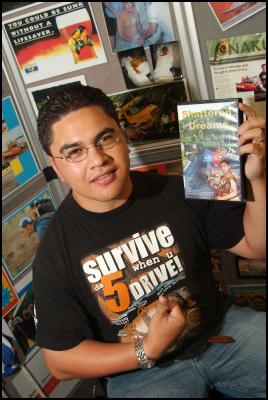Brain Injury Awareness Week 10 - 16 June
31 May 2007
Brain Injury Awareness Week 10 -
16 June

90 People Sustain A
Brain Injury Every Day
Crash Survivor Urges Them To Seek
Help
How many people realise a staggering 90 New Zealanders acquire a brain injury every day? That is nearly 33,000 every year, not including family and friends whose lives are also disrupted.
About half of these are the result of road crashes, a topic of great public concern at the moment.
One person who is doing something to make people think hard about the problem is crash survivor and safety campaigner Tamati Paul of Gisborne. As the "face" of Brain Injury Awareness Week 2007, he is urging people, particularly young people, to make the "right choices" about safe, sober driving and to take injuries to the head from any cause very seriously.
Once a sportsman of great promise, Tamati's dreams of Olympic kayaking glory were shattered in an instant by a drunken driver in a 1998 road crash in which he sustained horrific injuries including serious damage to his brain and major injuries throughout his body. The other driver, who died at the scene, was three times over the legal blood alcohol limit and drifted onto the wrong side of the road at 165kph.
Now after many
operations and a long, painful and frustrating
rehabilitation programme
Tamati, against medical
expectations, can walk, although with some discomfort, and
talk with some residual difficulty.
He now has a new mission in life: to take his story to audiences throughout the country, especially young people, reminding them to make the "right choices" on safe and sober driving, drug use, achieving goals and love and respect for whanau.
"People really know the right thing to do but everyone needs reminding from time to time," he says.
Despite his speech difficulties, Tamati captivates audiences from school assemblies to gatherings of workers with his passion, courage, sincerity, humour and mana. After showing a video "Shattered Dreams" that graphically portrays his story, he comes on stage to spell out his message personally. No matter the audience, he is heard in pin-drop silence and with great respect.
He jumped at the opportunity to speak out for Brain Injury Awareness Week.
"In our culture the head is so, so sacred. It must be respected and protected. And, when it sustains a knock, people must take it very seriously even if the damage seems fairly slight. It is vital that any significant impact to the head is reported and treated properly.
Brain injury awareness week … 2
"The number of New Zealanders who sustain an injury to the head is frightening. I urge everyone to take greater care and, if they do take a bump of any significance, to have it checked out."
The details of Tamati Paul's story bear further testimony to his extraordinary courage and determination.
His sporting achievements before the crash were already impressive. He had set a world marathon record in waka ama (outrigger canoeing). As a champion surf live saver he was a member of the national Inshore Rescue Boat team and was in line for selection in the New Zealand Olympic kayaking team. He was also an outstanding kapa haka leader touring internationally with top cultural groups.
His crash injuries included severe brain injury, abdominal and chest injuries, collapsed lung, loss of full eyesight, virtually every bone in his right side smashed and injuries to hips, arms and legs.
Airlifted to Gisborne and then Waikato Hospitals, his first operation lasted 16 hours, he was kept in coma for four weeks, his body was totally reconstructed and kept in a full body cast. He was kept in hospital for five months before going back to Gisborne for rehabilitation. Four years of pre-crash memory were wiped out.
He was not expected to live and, when he did, was not expected to walk or talk. But, aided by around-the-clock whanau support, his superb physical fitness, huge determination and sense of humour, he eventually came through a long, painful and frustrating rehabilitation programme.
John Clough, President of the Brain Injury Association of New Zealand (BIANZ) says this year's Awareness Week aims to alert the community to the large numbers affected by brain injury, build understanding of how to deal with it and to encourage prevention.
"It can happen to anyone," says John Clough. "When it does, we are there to help those who are affected and their families."
Year-round, regional brain injury associations provide an invaluable liaison service for people with brain injury and their families, helping them find appropriate professional help and providing advocacy, information and support. Most run a range of support groups.
To help sustain this work, there will be street collections between 10 and 16 June in most major centres.
ENDS


 Angela Wanhalla & Jacinta Ruru, The Conversation: Books Of Mana - 10 Essential Reads For Waitangi Day
Angela Wanhalla & Jacinta Ruru, The Conversation: Books Of Mana - 10 Essential Reads For Waitangi Day FASD-CAN: People With Fetal Alcohol Spectrum Disorder (FASD) Dismayed At Government’s Response To The Rights Of Disabled People
FASD-CAN: People With Fetal Alcohol Spectrum Disorder (FASD) Dismayed At Government’s Response To The Rights Of Disabled People NZ Opera: Jane Austen Opera Coming To Christchurch & Dunedin - South Island Premiere | NZ Opera’s Mansfield Park Returns This April
NZ Opera: Jane Austen Opera Coming To Christchurch & Dunedin - South Island Premiere | NZ Opera’s Mansfield Park Returns This April Sport Manawatū: Women’s Health Series Empowers Women To Prioritise Their Wellbeing
Sport Manawatū: Women’s Health Series Empowers Women To Prioritise Their Wellbeing Pure Adventure Charitable Trust: Iconic One New Zealand GODZONE To Make Triumphant Return To New Zealand’s Adventure Racing Scene
Pure Adventure Charitable Trust: Iconic One New Zealand GODZONE To Make Triumphant Return To New Zealand’s Adventure Racing Scene The Charter School Agency: New Charter Schools Open Doors To First Students
The Charter School Agency: New Charter Schools Open Doors To First Students 